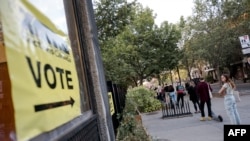Canadians voted Monday in a pandemic election that could weaken Prime Minister Justin Trudeau or reward his government's handling of the pandemic.
Trudeau gambled on an early election to try to capitalize on the fact that Canada is now among the most fully vaccinated countries in the world. But the opposition has been relentless in accusing him of calling an unnecessary early vote — two years before the deadline — for his own personal ambition.
Polls before the election showed Trudeau's Liberal Party in a neck-and-neck race with the rival Conservatives. The Liberals appeared likely to win the most seats in Parliament, but not a majority, forcing the party to rely on an opposition partner to pass legislation. However, an extremely close outcome could raise questions about Trudeau's judgment in calling the vote and whether he should continue to lead the party long-term. A majority win would cement his legacy and leave him in power for another four years.
Conservative leader Erin O'Toole's campaign chair said holding Trudeau to a minority government would be a win for O'Toole.
"Even without a plurality (of seats) today, we will have achieved our objective," Walied Soliman told the Toronto Star on Monday. "At the start of this race, nobody would've expected that we'd be in a knife fight in strongly held Liberal (districts). And today we are. And we are very proud of Erin O'Toole and the incredible campaign that has been run here."
Jenni Byrne, who served as campaign manager and deputy chief of staff to former Conservative Prime Minister Stephen Harper, told The Associated Press she was stunned by Soliman's comments and said Soliman made a big mistake when Canadians are still voting.
Soliman later tried to clarify.
"My comments in the Star are being misrepresented unfortunately. Let me be very clear: this election is too close to call. We may not know the result for days. Every vote will count," he tweeted.
A combination of high expectations, scandal and calling the vote during the pandemic hurt the brand of the 49-year-old Trudeau, who channeled the star power of his father, the Liberal icon and late Prime Minister Pierre Trudeau, when he first won election in 2015.
Still, Trudeau is betting that Canadians don't want a Conservative government during a pandemic. Trudeau's government spent hundreds of billions of dollars to prop up the economy amid lockdowns and he argues that the Conservatives' approach, which has been skeptical of lockdowns and vaccine mandates, would be dangerous and says Canadians need a government that follows science.
O'Toole hasn't required his party's candidates to be vaccinated and won't say how many are unvaccinated. O'Toole describes vaccination as a personal health decision, but a growing number of vaccinated Canadians are becoming increasingly upset with those who refuse to get vaccinated.
"We do not need a Conservative government that won't be able to show the leadership on vaccinations and on science that we need to end this," Trudeau said at a campaign stop in Montreal on Sunday.
Trudeau supports making vaccines mandatory for Canadians to travel by air or rail, something the Conservatives oppose. And Trudeau has pointed out that Alberta, run by a Conservative provincial government, is in crisis.
Alberta Premier Jason Kenney, an ally of O'Toole, said the province might run out of beds and staff for intensive care units within days. Kenney has apologized for the dire situation and is now reluctantly introducing a vaccine passport and imposing a mandatory work-from-home order two months after lifting nearly all restrictions.
A Conservative win would represent a rebuke of Trudeau against a politician with a fraction of his name recognition. O'Toole, 47, is a military veteran, former lawyer and a member of Parliament for nine years.
O'Toole advertised himself a year ago as a "true-blue Conservative." He became Conservative Party leader with a pledge to "take back Canada," but immediately started working to push the party toward the political center.
O'Toole's strategy, which included disavowing positions held dear by his party's base on issues such as climate change, guns and balanced budgets, was designed to appeal to a broader cross section of voters in a country that tends to be far more liberal than its southern neighbor.
The wild card could be a politician who narrowly lost the leadership of the Conservative Party in 2017 but who now leads a far-right party that opposes vaccines and lockdowns. Polls suggest as many as 5% to 10% support for Maxime Bernier and the People's Party of Canada — potentially bleeding support from O'Toole's Conservatives and helping the Liberals retain power.







